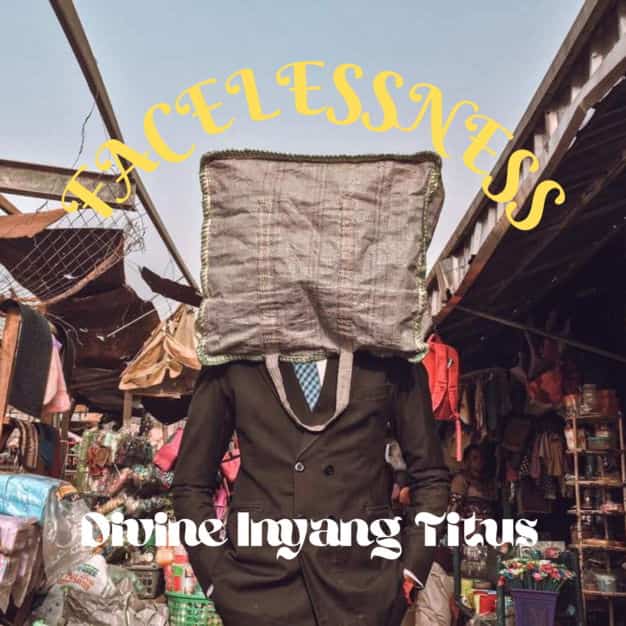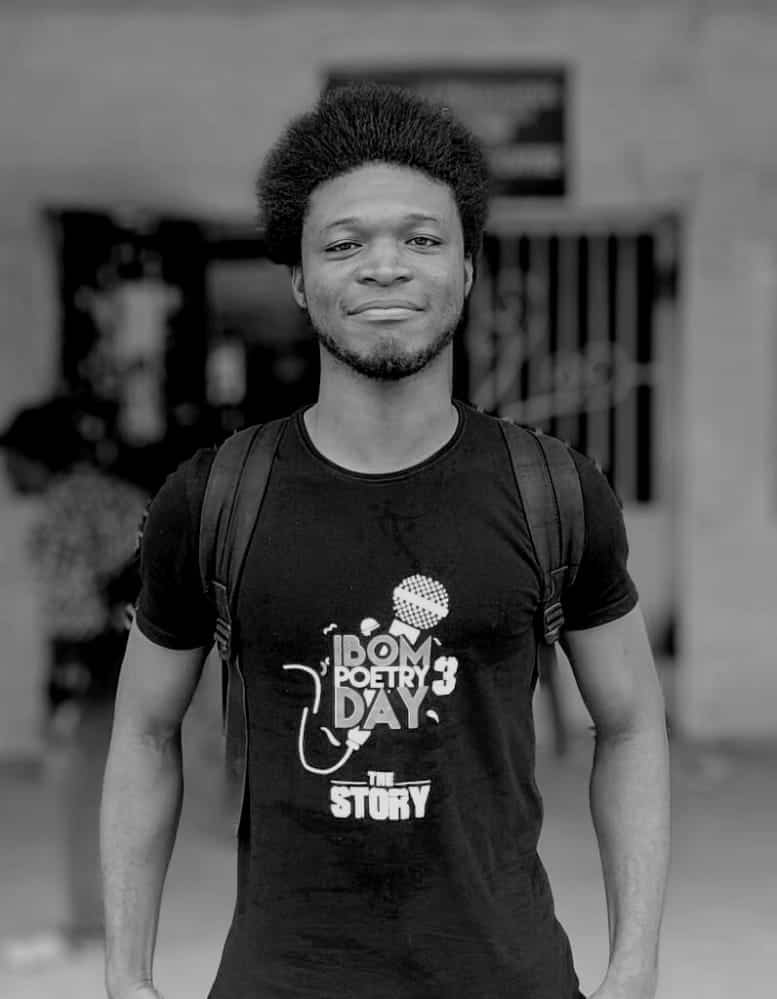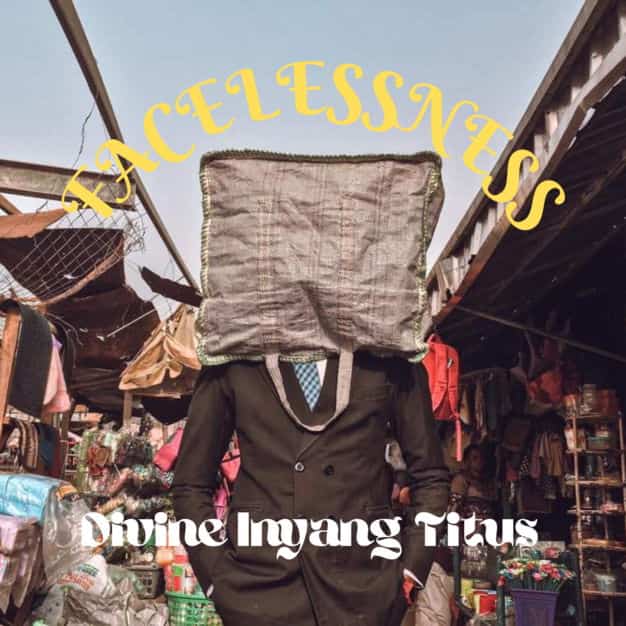
It was a faceless time when we moved into the new compound that March, Ray and I, carrying our luggage in two great Ghana-must-go bags, and a carryall. In another time, perhaps we would have shaken hands loudly with the neighbours, bumped shoulders, and sat together to chatter. Now we only bumped wrists and hurled pleasantries from a distance. This new compound was fairly large, with a pale sky full of unraveling darkness behind it. The rooms were all about the same size, all of them with aging walls and roofs and dingy green paint. We’d decided to be careful; we’d wash our hands, first with spurts of sanitizer and then in bubbles of fragrant Morning Fresh. Outside the house, we’d always wear our nose-masks, properly, never on our necks as people were wont to do. If we could get hand gloves to wear, we would. There was no way in the world we were going to let the disease get the better of us.
The virus had only newly hit the state and measures were hurriedly announced: a total lockdown, of schools, businesses, everything. So, most of the tenants were at home now, and opinions were flying around; theories, too, about China and Bill Gates and mind control.
We observed that there were three kinds of people in the compound. There were the ones who locked themselves in their rooms, to be seen taking a pee at dawn or dusk, with reusable gloves and bluish masks over their mouths; the ones who would wear masks but also shook hands indiscriminately; and the ones who touted 5G theories and denied the virus ever existed. The compound housed them all inside its feeble fence, rickety gate and brown earth. Enclosed them like a folded fist holding a butterfly. For the last group of people, Ray had nothing but disdain.
“Dey look,” Ray said to me once, “after one week, all these people wey no gree get sense go begin get.”
He was referring to our next-door neighbour, Aunty Helen, a buxom woman of about 40 who snored loudly, owned an aging salon and wore contact lenses. She was the first person we heard argue against the existence of the virus in the compound. We’d been in our room that day; it was about an hour or so after daybreak. I was half-awake, trying to convince myself to rouse and wash. Ray was on his laptop. I could hear the buttons clicking intermittently. We heard raised voices and knew that the usual congregation that gathered every morning had convened again. On very good days, they are a solid 10-man army of analysts, arguing everything from politics to irregular nouns to the correct spelling of social distancing, and disagreeing wildly. The prominent talkers were Uboglo, who framed pictures in a small shop on Eka Street; Oga Samuel, the electrician whose catchphrase was “life na scam”; Praze, a gospel musician; and of course, Aunty Helen, the salon owner who, as we later learnt, doubted everything.
That morning, the first raised voice that conveyed any meaning to our ears was saying:
“…but do you know anybody that has the virus?”
Too many voices replied, then the voice arose again – Aunty Helen’s – this time more distinct, high pitched and rough at the edges.
“But you don’t ‘know! You’ve only heard. From where? The media! They’re lying to you to make money and you foolishly believe them.” Then a crackling laughter followed, swallowed in a succeeding swarm of raised voices.
I won’t deny that I entertained the thought for a flimsy second; of it all being a giant lie, fabricated in order to execute some great 21st century sin. But the thought died instantly. Everybody in the world couldn’t be lying at the same time. The people buried in mass graves in Italy and Iran certainly weren’t a lie.
Ray was livid.
“Na Aunty Helen go first catch that virus for this compound. Dey watch.”
I’d nodded, agreeing more out of malice for her than the truth of Ray’s prediction. When the news spread two weeks later that more than 48 people were infected with the virus already and a curfew was to be called, we were surprised to hear the same crackling laughter from Aunty Helen. Now, she even broadened the skepticism.
“Do you know anybody that knows anybody that has corona?” And Oga Samuel’s laughter was a deep bellow of enjoyment.
We stayed indoors most of the time, Ray and I. I expected it’d be particularly hard on Ray since he thrived outside, in the sun. But surprisingly, he adjusted fine. Apparently, his fear of contacting the virus exceeded his love for the sun, for the parties still being held in secret in which he would normally have been performing his rap songs wearing his signature peach ski mask. As for me, I watched the world decline slowly, and it felt good. It now felt legal being indoors in my natural habitat for days on end, having minimal human contact. But the sight of the bare streets still shocked the air out of my lungs, especially the popular Long Road and Plaza, notorious for their throbbing pulse and hustle. It scared me to see all those stores, all those livelihoods muted, faceless.
Ray was becoming unsettled. Today, he showed me a video of a man who’d recorded his experiences as a corona patient and he said: “See! See! See what our government is playing with. We’re all going to die!” and I’d try to calm him down:
“Maybe ours will be different…”
“How? How? This is oyibo people oh, with all their technology, dying like this. How much more us?”
He showed me others, of a doctor who committed suicide, confessions of virologists who allegedly fled from China detailing gruesome conspiracies of a plan to infect the world and make fortunes off commercial cures.
“Calm down, Ray.”
“Calm down? 30,000 dead worldwide and you’re asking me to calm down?”
Sonia, his girlfriend, was getting concerned. Ray was communicating frigidly, refusing to consent to any meetings. He said he didn’t feel safe, and ranted about how he wasn’t sure we were going to make it to the next month alive. She called, asking me to talk to him. I tried again.
“Do you know that the last time a flu-like virus hit the world, it killed 50 million people?”
“It won’t happen this time,” I said.
“And how do you know so?”
“Your relationship is suffering, man”.
“Let it suffer. It’s better than us dying.”
That final bit shocked me because I knew Ray to be all about his girl. But what is it they say about people and change? In my head though, it wasn’t easy to fault Ray’s extreme logic. This was Africa after all, and we were grossly inept at many things. Perhaps he was right to fear, to expect death in innumerable millions, bodies piled over each other, stench and flies. Yet in my heart, I couldn’t see the sense in postponing life until one was too sure of it. Could we ever be too sure? There was something incredibly toxic about it all, wearing me out. Plus I was surrounded by theories within and theories without, and an almost imminent promise of some dank apocalypse.
By now, the 5G theories were at their summit, everywhere, carried by popular clergymen and intellectuals. Once, we heard Praze raving about it to the morning congregation. Uboglo and Aunty Helen attacked him for being an unthinking sheep, and he’d clapped back:
“You, how do you know it’s a lie? How? With your masters in framery and salonery.”
And the din broke again, swallowing remnants of voice and my willingness to listen.
Ray spat: “fucking daft idiots.” His face furrowed over his phone. He’d grown more withdrawn, more shadowed, more faceless. If I returned from anywhere, he’d throw a tantrum about my not washing my hands properly. Once, I asked him to accompany me to empty our trash at a nearby dumpage just down the street and he declined dryly, spitting his refusal at my face.
“No way in hell you’re seeing me outside.”
“Ray. Will you….will you stop being a child for once in your whole life?”
He sat up quickly.
“Why do you think the numbers are only climbing slowly?”
“Obvious reasons, Ray. There’s a lockdown and a curfew.”
“Nonsense! Was there no curfew in New York? Or in Rome? Didn’t the number rise exponentially? And your godforsaken governor is playing politics with people’s lives,” he coughed into the crook of his elbow, “covering up the actual number of cases so that people would feel safe! And you want me to go outside with you! I’m not putting myself in danger.”
“What do we do with the trash then?”
“We wait for aboki.”
I left to go buy garri and a few cups of beans later that evening from a store a moderate distance away. Ray may be allowed to think that meals will cook themselves, but I wasn’t. The sky looked pale, tepid. A soft sun adorned it near a cluster of pallid grey clouds, spilling wan lights. Sonia reached out again.
“Jay, he refused to see me before we even got our first case in this state. What’s his excuse?”
What was Ray’s excuse? I’d never seen paranoia take such extreme form. And I wondered whether the right response was to be forthright with him or to be more compassionate, tenderer. Ray was certainly making it more difficult, his paranoia fed to bursting in a compound full of conspiracy enthusiasts and covidiots. As she spoke, she sounded like loss, those strained, pungent notes were there in her voice. And they made me wince.
“I’m getting tired, Ray. Why is he acting like the virus is affecting him alone?”
I said I didn’t know. And I didn’t. Three years with Ray and I thought I knew him well enough, thought we were fire and ice, vigor and sobriety. He said for me the words I couldn’t express, while I heard all the ones he didn’t. This time I heard nothing; in the down cast of his brow, the oily foreboding that creased his forehead, bearing upon a face becoming faceless by the day.
“They want to take control of the whole world, that’s why they manufactured the virus,” he told me while we took spoonfuls of beans and complemented it with soaked garri. “China engineered the virus so that U.S will bow. When they have the U.S, they’ll invade us.”
The vacuity of his eyes held a blurred laughter in them. A knowing, self-disparaging laughter. He coughed and I passed him a cup of water. His eyes scanned the cup. I knew for a while now he’d been suspecting he had caught the virus, or I’d given him. He clutched his throat diffidently and seemed to listen for the virus moving in his lungs. Every time he coughed, he held his breath afterwards for some seconds and waited, his eyes frantic; a sort of litmus test for the Coronavirus infection, then he allowed himself a rush of breath and then exhaled “thank God.”
Earlier, he tried to convince me that most people in the compound had caught the virus, were all hiding behind closed doors, taking doses of malaria tablets. Perhaps he was right. The morning congregation had been thinning for some time now. Aunty Helen had been largely indoors, an uncanny and brooding silence on her lips each time she walked her big body to the bathroom. The loud hailing and banter with Praze or Oga Samuel died, too. I even thought I heard Aunty Helen coughing in her room, but I wasn’t sure. A chill crawled up my spine, like dead-cold fingers. That was before I heard, in the thin congregation that formed the next day, how Praze had called Aunty Helen an ‘old hag’ for calling his 5G theory “very stupid.” They say Samuel leaped to her defense and Uboglo to Praze’s. There was a brawl, some threat of fisticuff; a rapid dispersal that I thought signified the end of the rowdy morning congregation. But the congregation gathered again the next couple of days at daybreak; apparently, these spats afford them their little bit of leisure. Today, Praze and Aunty Helen tackled Uboglo, going back and forth:
“6ft isn’t enough to bury a dead Coronavirus patient, for god sake!”
“It’s enough!”
“6ft isn’t enough!”
“I said it’s enough!”
How it happened in the end, no one can really say, but the virus passed over us. It’s not something I or anyone can explain in a few words, the way the chart defied projections, the way its curves flattened, rejecting the propensity of our deaths. No one can dare say we were doing things right. We weren’t. I remember when we all tired of the facemask gimmicks, when our eyes began to say ahh, fuck it. If this virus would’ve killed us, we’d have already been dead by now, and quickly, we picked life right up from where we left it. Once, after a very long time, I boarded an okada through Plaza and Long Road, and the sheer volume of people I saw there! Scattered all across and noising their way through recovery. Slowly, Ray began to exhaust his fears. One day, he finally decided to go see Sonia.
“I’m going to fix things.”
He left at sunup, as though spooked by something. Didn’t even care to brush. When I saw him returning, that very evening of the rowdy neighbours’ reunion, through the gate, his head nudged forward as though spared from falling by the dutiful devotion of his neck, I could already read the mourning in his steps. He entered quietly, looked at me wearily and sighed. Wasn’t “6ft apart” a symbolic quality?

Divine Inyang Titus
is a writer, performance poet, and songwriter keen on exploring the nuances of the human experience through art. He is the author of the chapbook A Beautiful Place To Be Born, and his works have appeared or are forthcoming in Brittle Paper, The Kalahari Review, The Fiery Scribe Review, Eye To The Telescope magazine, Seven Flowers of Gratitude Anthology (BPPC, April/May, 2020), Poetry Column-NND and elsewhere. He deeply enjoys reading, making music, and observing the rudiments of excellence. He is ‘Divine Inyang Titus’ on Facebook, @IcyDEEE on Twitter and @wolfgang_frost on Instagram.

